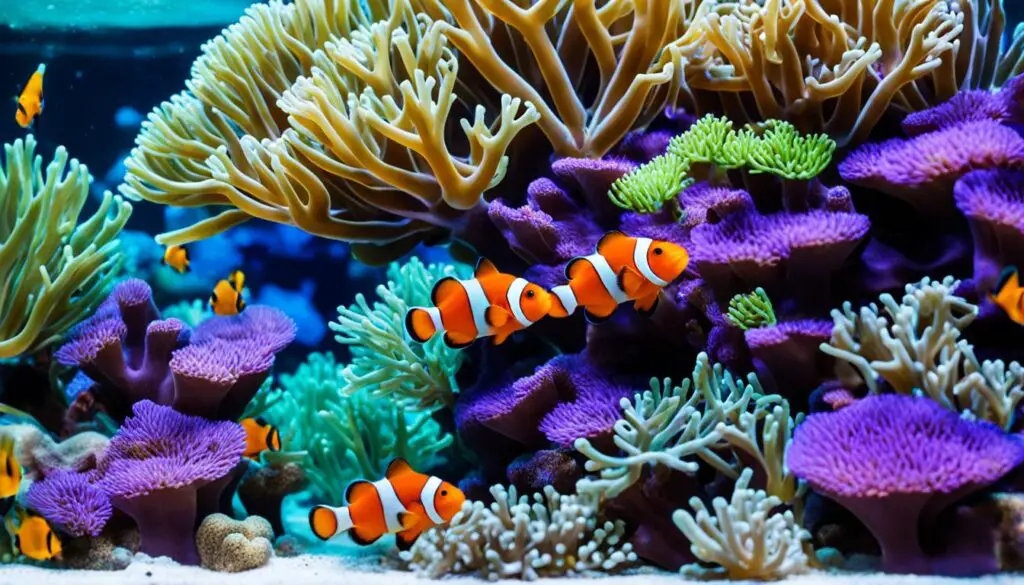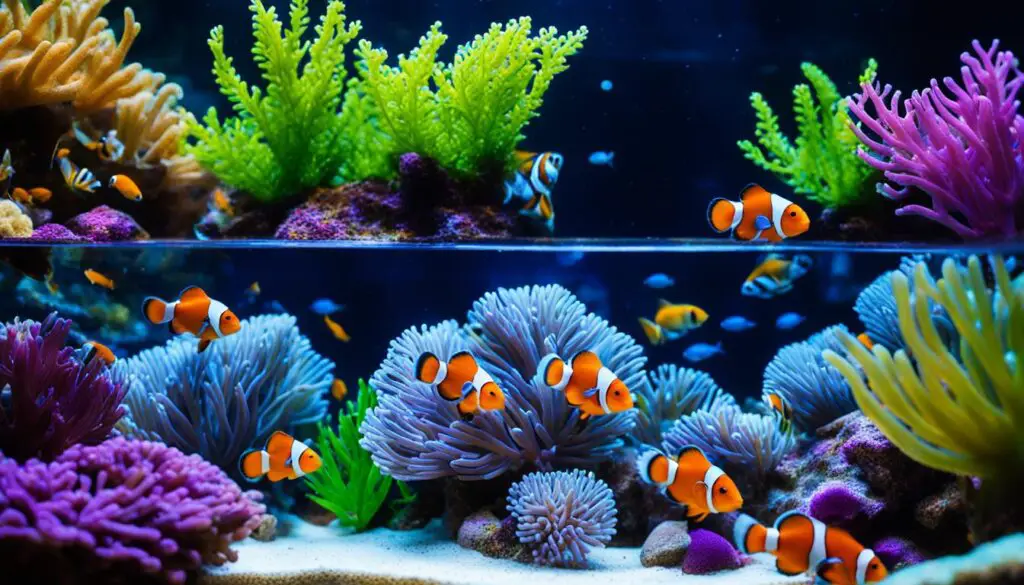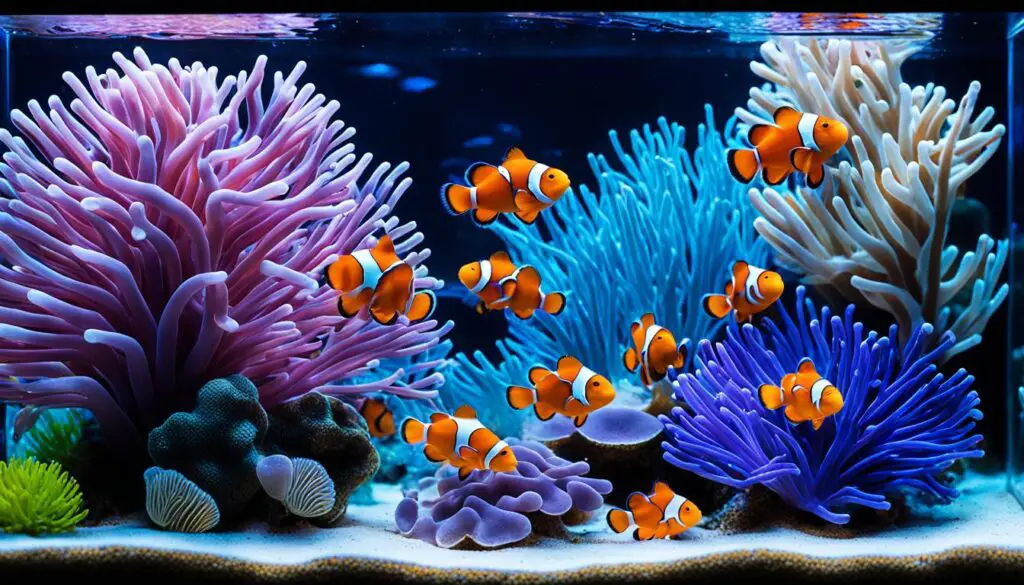Decoding Clownfish Behavior: Understanding Their World
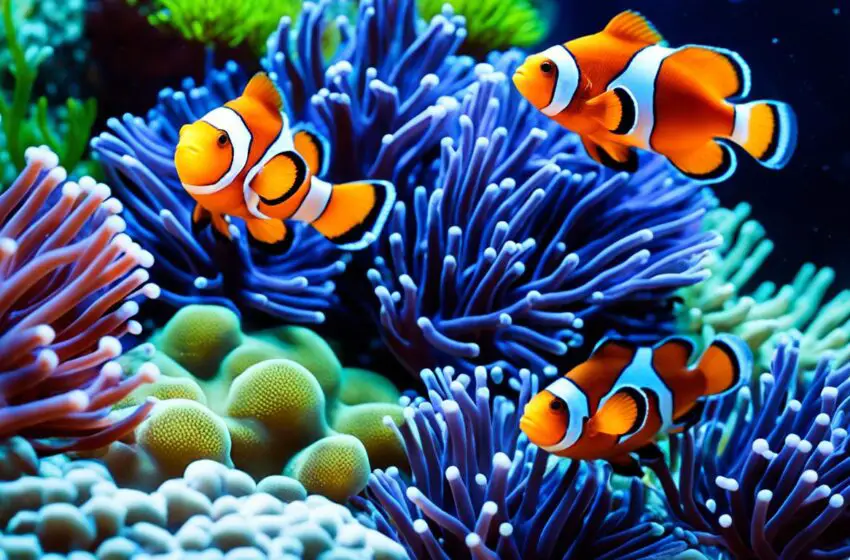
Clownfish behavior is very interesting. It teaches us a lot about their health, and the health of the sea. We can learn about their sleep, how they act, and what they think. This helps make the best home for them. Let’s look at what we know about how they sleep, their daily and nightly life, and what affects their rest.
Key Takeaways:
- Clownfish behavior can give us clues about their health and the sea’s health.
- Knowing how they sleep is key to taking good care of them.
- Research looks at when they sleep, how they sleep, and what they do at night.
- Things like water temperature and salt levels affect their sleep.
- Learning about their behavior can help us keep clownfish healthy in tanks.
Exploring how clownfish act is vital for their well-being and the sea’s health. By studying their sleep, interactions, and thinking, we can make sure they have a great life.
Decoding Clownfish Sleep Patterns
Clownfish, like many animals, are active in the day and rest at night. They sleep by being still and not swimming much. Often, they hide in sea anemones when they sleep.
Clownfish rest more at night and get ready for the next day. It’s very important to know how they sleep. This helps create the right tank so they can sleep well.
Things like water temperature, how salty the water is, and how much oxygen is in can change how they sleep. If the water isn’t right, it can keep them from resting well. Always keep their home’s water perfect for them.
Making their tank feel like their natural home is key. Have places to hide and keep the water super clean. A calm tank makes them less stressed and sleep better.
Nighttime Activity
Clownfish are much less active at night than in the day. They rest and sleep to stay healthy. At night, they also do things they enjoy, like moving around and being with their friends.
It’s important to make the tank nighttime-friendly. Set up a tank with hiding spots so they can relax. These spots make them feel safe and act naturally.
Environmental Factors
The water’s temperature is really important for clownfish. Wrong temperatures can keep them from sleeping well. Keep the water just right for them.
The amount of salt in the water matters a lot, too. They are used to a certain saltiness. Changing it too much can worry them and keep them from resting. Make sure the salt level is good for them.
Enough oxygen in the water is a must for their sleep. Without it, they might get sick and not sleep well. Always keep the tank well-aerated for their health and sleep.
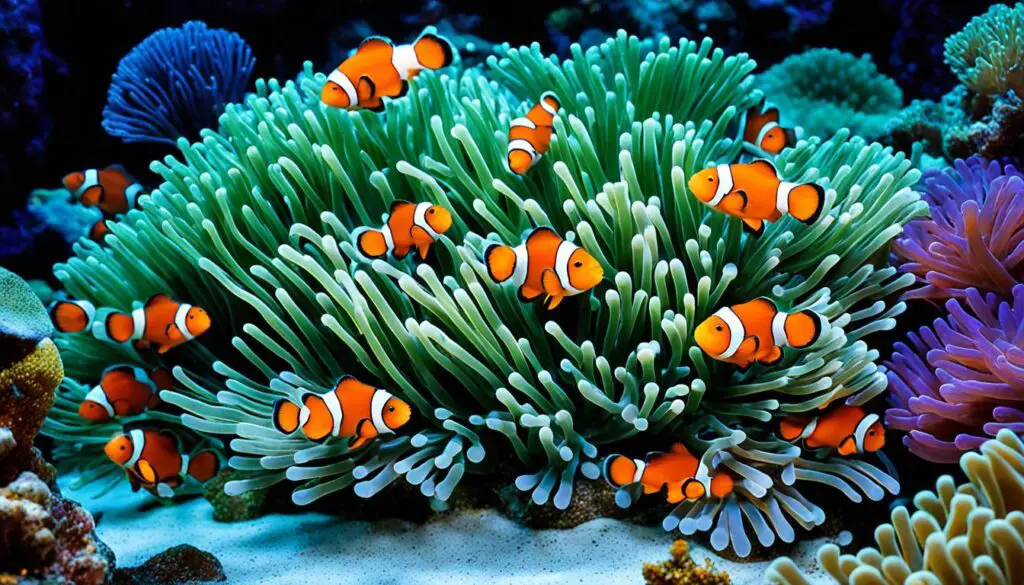
| Environmental Factors | Impact on Clownfish Sleep Patterns |
|---|---|
| Water Temperature | Variations outside the optimal range can disrupt sleep. |
| Salinity Levels | Significant deviations from their natural habitat can cause stress and disturbances in sleep. |
| Oxygen Levels | Insufficient oxygenation can lead to reduced sleep quality and health issues. |
The Importance of Sleep for Clownfish Health
Adequate sleep is key for clownfish health. It’s just like how we humans need good sleep to stay well. Quality sleep for clownfish supports their immune system and general health. Without enough sleep, their immune system gets weak. This makes them more likely to get sick.
How peaceful their tank is affects how well they sleep. A calm tank without fights is a must. Too much stress can really mess up a clownfish’s sleep. It can also cause other health problems.
Setting up the tank right is crucial for clownfish to rest well. It means having clean water thanks to a good filter. Plus, the lights should turn off at night to match their natural sleep cycle. Also, they need plenty of places to hide when they sleep.
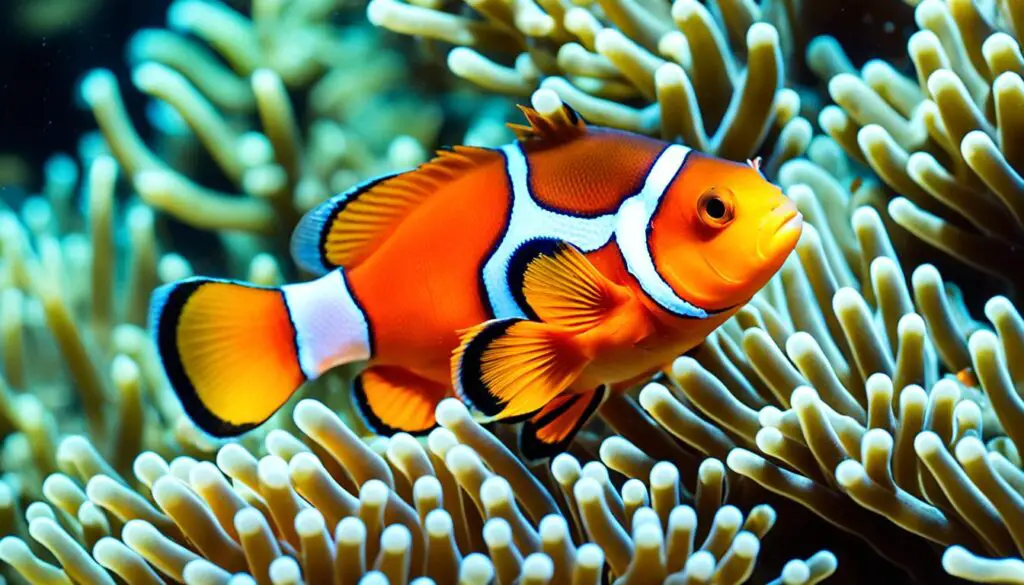
Focusing on these things can make your clownfish sleep better. Prioritizing their sleep helps them live their best life in a tank.
Conclusion
It’s important to know how much sleep clownfish need in captivity. We must be responsible and make sure they get the right care.
Clownfish need places to rest that feel like home. This includes using rocks, caves, or fake sea anemones. It gives them a safe and natural spot to sleep.
We also need to keep their tanks healthy. This means cleaning the water, checking its quality, and having the right lights. Making sure the water is just right helps the clownfish sleep well.
We can always improve how we take care of our clownfish. They need both a good physical environment and our emotional support. Let’s show these colorful fish how much we care and make their lives great.
FAQ
What are some common clownfish behaviors to look out for?
Clownfish are known for their active wiggling swim. They often live in sea anemones. You might see them do special dances during mating.
How do clownfish sleep?
Clownfish rest at night, just like people. They sleep in sea anemones. They move less and rest more when they’re sleeping.
What factors can impact clownfish sleep patterns?
Water conditions like temperature and oxygen can affect their sleep. The right tank conditions are vital for their health.
Make sure the tank is perfect for them so they can sleep well.
Why is sleep important for clownfish health?
Sleep keeps clownfish healthy and their immune system strong. Lack of sleep makes them more likely to get sick.
So, they need their rest to stay in good shape.
How can I provide a suitable sleeping environment for my clownfish?
For a good sleep environment, add hiding spots to the tank. Mimic their natural home as much as you can.
Make sure the tank is clean, has the right light, and is peaceful.
How can I reduce stress for my clownfish and improve their sleep?
Keep the tank environment calm and steady to cut stress. Ensure the tank’s conditions are just right.
Also, avoid making sudden changes to their home.
How can I promote the overall health and happiness of my clownfish?
To keep clownfish healthy and happy, learn what they need. Set up the tank right and help them sleep well.
Love and attention are the best ways to care for them.

